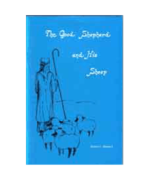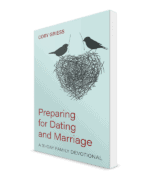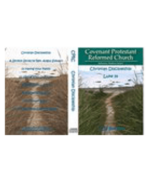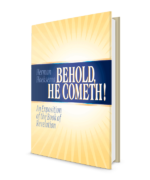In seven succinct chapters, the author brings to both single and married believers, in a straightforward way, the intensely practical instruction of the apostle Paul on sex and marriage.
In what calling am I to please God—in marriage or single life? How can I please my husband or wife sexually? If I have an unbelieving or miserable spouse, what does the Lord require of me? What is the relationship of the children of believers to the covenant of grace? How am I to rear my covenant children? As well as answering such questions and many more, this book also exposes the evils of a “Joseph marriage,” requiring “unmarried priests,” divorce for any ground other than fornication, and remarriage of both the guilty and the innocent party while their spouse is still living.
Added as an appendix is “The Remarriage of the ‘Innocent Party’—A Sermon,” a careful explanation of Matthew 19:9.
To watch the video of the author interview concerning this book, click here.
This book can be read on-line in Dutch.
“Just finished reading Better To Marry by David Engelsma, This book is very helpful and practical. Fornication is a soul destroying sin, and keeping company with fornicators is as bad as keeping company with drunkards because bad company corrupts.” – England
REVIEW
Better to Marry, by David J. Engelsma. Grand Rapids: Reformed Free Publishing Association, 1993. 105 pp. (paperback). [Reviewed by Rev. Audred Spriensma.]
Prof. David Engelsma has written another small book (105 pages) on the subject of marriage. His first book, Marriage: the Mystery of Christ and the Church, was first published in 1975 and has been reprinted several times. It is a fine book on the nature and demands of marriage based upon the teaching of God’s Word from Ephesians 5. The Christian couple in their marriage relationship are to be a picture of the glorious relationship between Christ and His church. As a pastor I was happy to give that book to all the young couples I married in my previous churches.
Now we have another book from the able hand of this writer and pastor. This book is not to replace the first book but to supplement that teaching. Now Prof. Engelsma draws from the teaching of God’s Word as it is found in that classic passage of marriage, I Corinthians 7. Here God’s Word gives us the very practical and earthy basis for marriage and the answers to problems in marriage.
We need this. Too often God’s people listen to the wisdom and advice of the world concerning sex and marriage, advice not based upon God’s Word and therefore advice that leads the saints astray. Prof. Engelsma writes, “It becomes increasingly rare that the churches and their teachers base their instruction and guidance squarely on the Word of God … the churches are ready to give counsel that deviates from, and even plainly contradicts Holy Scripture. In the end, there is no difference between the advice of the unbelieving counsellor and the advice of the supposedly Christian counsellor.” Or again he writes, “Either the churches officially adopt reports that sanction the sexual activity of the unmarried, the unbiblical divorcing and the remarrying of the married, and the homosexual lust and conduct of married and unmarried; or the churches preach a grace of God in Christ that approves all this wickedness by tolerating it in the lives of professing Christians and in the fellowship of the congregation.” Prof. Engelsma, correctly I believe, lays the blame of much of the sin where it belongs, i.e., on the church. Office-bearers will have to give an account to the Head of the church in the Judgment Day for having caused these little ones to stumble.
The theme of the book is that it is better to marry in order to flee fornication. Fornication was common in the pagan world of the apostle Paul’s day, as it is also in our day. We live in a sex-saturated society. As Prof. Engelsma points out in regard to fornication: “It is no different from eating, except that more effort is put forth to stir up the appetite for fornicating than for eating.” In this age the church must speak plainly and unashamedly about sex in the single life and in marriage.
The author can be thanked for his careful exegetical treatment of I Corinthians 7, pointing out how modern translations have corrupted the teaching of God’s Word. At the end of each chapter Prof. Engelsma sums up the teaching of God’s Word and lists implications of this teaching for the conduct and attitudes of believers and the church. And coming through loud and clear, as must be the case, is the gospel to those who have sinned, or are struggling with homosexual feelings: “It (the Gospel) forgives all past sins of fornication, including homosexual sins … and it breaks the ruling power of the sin of fornication. Whether the gospel has the power to deliver those who have the perverse desire for people of their own sex, so that they crucify this desire and resolutely refuse to practice it, is not even a question in the church where the gospel is known” (p. 10). Again, “… for those who have already broken God’s law concerning marriage, whether by fornication, by an unbiblical divorce, or by remarriage, there is a way of escape from condemnation. This way is by repentance. Repentance finds forgiveness in the atoning death of Jesus Christ. There is abundant mercy in the Saviour to blot out the guilt of fornication, desertion, divorce, and remarriage. But repentance breaks with the sin and walks henceforth in obedience to the .ordinances of God, regardless of the cost” (p. 87).
The book contains a nice section on the single person. Single life is often neglected or looked down upon. But God’s Word shows that the single life is honourable and even beneficial for the Kingdom of God. Personally I would like to see the author write a separate book on this important topic. Or perhaps we would be better served with a different title to this present book, such as “Serving the Lord in Single or Married Life.” Singleness as a lifelong state is honourable.
Christians who desire to live for God’s glory and in obedience to God’s Word whether single or married would do well to read and apply the down-to-earth practical instruction that one finds in this book.
Prof. Engelsma concludes the book with a sermon in an appendix regarding the sin of remarriage. It is well that the book ends with a sermon. It shows that not only is it possible for the church to preach these practical truths but also necessary, for preaching is the means of grace that God uses and blesses to lead His church in the truth.









